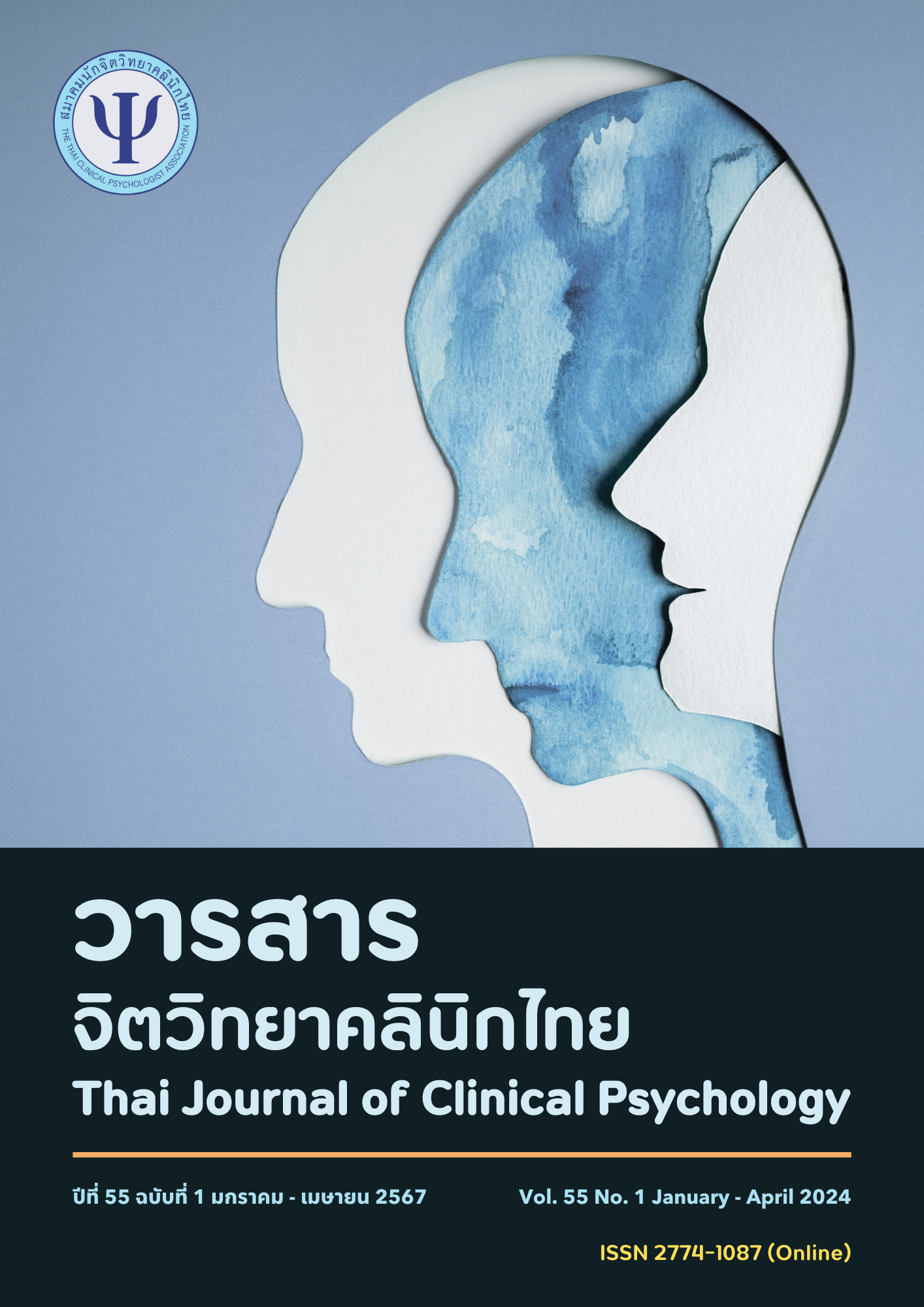Effects of a Mindfulness-Based Cognitive on the Psychological Well-being of Single Mothers
Main Article Content
Abstract
Objectives: 1) To assess the changes in the mean psychological well-being of single mothers within the experimental group by comparing scores before and after the experiment. 2) To examine variations in the mean psychological well-being among single mothers by comparing scores between the experimental group and the control group. Materials and methods: A quasi-xperiment research was employed with a pretest-posttest control group design. The target group was 22 single mothers who were solely responsible for raising their biological children, selected according to specified criteria from the Ban Kredtrakarn Protection and Vocational Training Center in Bangkok. They were divided into an experimental group of 11 and a control group of 11. The instruments used for data collection were 1) a mindfulness-based cognitive counseling group program, and 2) a mental well-being measure. Data were analyzed using paired and independent sample t-tests. Results: 1) The average psychological wellbeing of the experimental group after the experiment was significantly higher than before the experiment at the .05 level. 2) After the experiment, the experimental group had a significantly higher average psychological well-being than the control group at the .05 level. Conclusion: The mindfulness-based cognitive counseling group program could enhance the psychological well-being of single mothers.
Article Details

This work is licensed under a Creative Commons Attribution-NonCommercial-NoDerivatives 4.0 International License.
เรื่องที่ลงตีพิมพ์ในวารสารจิตวิทยาคลินิกแล้วถือเป็นลิขสิทธิ์การเผยแพร่โดยวารสารจิตวิทยาคลินิกแต่เพียงผู้เดียว การตีพิมพ์หรือเผยแพร่ซ้ำในที่อื่นต้องได้รับอนุญาตจากกองบรรณาธิการวารสารฯ
References
Adsakul, S. (2014). Situation of Thai families: A case study of single parent families in the area of Bangkok Metropolis. Journal of Politics, Administration and Law, 5(1), 17-45.
Aghababaei, S., & Taghavi, M. (2020). Effectiveness of mindfulness-based cognitive therapy on mothers' psychological well-being of children with Autism and reduction of symptoms these children. Shenakht Journal of Psychology and Psychiatry, 6(6), 88-100.
Asampinnawat, O., Wanjan, S., & Raksachom, K. (2019). A model of the single mothers’ s livelihood in the integrated Buddhist perspective. Journal of MCU Nakhondhat, 6(3), 1487-1511.
Bradburn, N. M. (1969). The structure of psychological well-Being. Aldine Publishing Company.
Burns, R. A. (2017). Psychosocial well-being. In P. Nancy (Ed.), Encyclopedia of Geropsychology (pp. 1977-1984). Springer Singapore. https://doi.org/10.1007/978-981-287-082-7
Chuebankoh, N., & Dangdomyouth. (2019). The effect of mindfulness-based cognitive therapy program on depression of bipolar disorder patients, Journal of the Police Nurses, 11(2), 421-432. (in Thai).
Chussanachote, W., Dallas, C. J., & Hengudomsub, P. (2018). The protective factors influence on psychological well-Being among aging people. Journal of The Royal Thai Army Nurses, 19(Suppl. 1), 373-381. (in Thai).
Corey, G. (2017). Theory and practice of counseling and psychotherapy. Cengage Learning. Cronbach, L. J. (1970). Mental tests and the creation of opportunity. Proceedings of the American Philosophical Society, 114(6), 480-
https://www.jstor.org/stable/986147
Dupuy, H. J. (1977). General well-being schedule. In I. McDowell, & C. Newell (Eds.), Measuring health: A guide to rating scales and questionnaire (2nd ed., pp. 206-213). Oxford niversity Press.
Esmaeili, M., Basiri, N., & Khayer, Z. (2016). The effects of mindfulness-based cognitive therapy (MBCT) on psychological well-being of mothers of children with learning disabilities. Journal of Learning Disabilities, 6(1), 26-39.
https://jld.uma.ac.ir/article_454_en.html
Karunanayake, D., Aysha, M. N., & Vimukthi, U. (2021). The psychological well-Being of single mothers with school age children: An exploratory study. International Journal of Scientific Research in Science and Technology, 8(1), 16-37.
Mungpanich, A., & Kudkung, K. (2020). Effect of mindfulness-based therapy and counseling group on suicidal risk of prisoners. Journal of Mental Health of Thailand, 28(3), 240-251. (in Thai).
Phon-ngam, P., Chanroung, T., & Suton, C. (2020). Activity development to promote mental health of the aging population in Loei Province. Journal of Demography, 36(1), 48-59. (in Thai).
Phuphaibul, R., Jongudomkarn, D., Nieamsup, T., Dechakupt, J., Kumhom, R., Wacharasin, C., Thayansin, S., Phatthayothin, N., Phothawin, T., Deoisres, W., Patoomwan, A., & Nittayasutthi, D. (2018). Changes in Thai family structure over the life cycle: A preliminary study. Journal of Demography, 34(1), 58-71. (in Thai).
Pimtaworn, J., Nathalang, S., & Chinnasri, O. (2014). Life aspects of single mothers. Journal of Social Sciences and Humanities, 40(1), 85-97. (in Thai).
Prewnim, A. (2019). Estimating the reliability of a new stratified alpha coefficient for a multidimensional measure of psychological well-being [Unpublished doctoral dissertation]. Burapha University. (in Thai).
Raksat, D. (2014). The effect of Buddhist characteristics on psychological well-being of adolescents in holistic mind development for youth project of the Your Buddhists Association of Thailand under Royal Patronage: The
mediating roles sense of coherence [Unpublished master’s thesis]. Srinakharinwirot University. (in Thai).
Ryff, C. D., & Keyes, C. L. M. (1995). The structure of psychological well-being revisited. Journal of personality and social psychology, 96(4), 719-727. https://doi.org/10.1037/0022-3514.69.4.719
Samutachak, B., Rittirong, J., Chuanwan, S., Thianlai, K., Nitnara, P., & Somta, S. (2022). Thai family 2040. Institute for Population and Social Research Mahidol University. (in Thai).
Segal, Z., Williams, M., & Teasdale, J. (2018). Mindfulness-based cognitive therapy for depression. Guilford Press.
Sukjai, K. (2019). Single-parent family: Challenges that must be overcome in today's Thai society [Unpublished manuscript]. Office of the Royal Society. http://legacy.orst.go.th/wp-content/ uploads/2019/05/ครอบครัวเลี้ยงเดี่ยว-ความท้าทายที่ต้องก้าวผ่าน.pdf (in Thai).
Tarar, A., Asghar, H., Ijaz, M., & Tarar, M. (2021). Psychological wellbeing and adjustment of single parents: Psycho-social and economic challenges. Pakistan Armed Forces Medical Journal, 71(Suppl-1), 576-581. https://doi.org/
51253/pafmj.v71iSuppl-1.5140
Teasdale, J. D., Segal, Z. V., Williams, J. M. G., Ridgeway, V. A., Soulsby, J. M., & Lau, M. A. (2000). Prevention of relapse/recurrence in major depression by mindfulness-based cognitive therapy. Journal of consulting and
clinical psychology, 68(4), 615. https://doi.org/10.1037/0022-006X.68.4.615
Thitiphongworaphat, P. (2021). The results of using the program consultation with Buddhist groups for enhancing charity thinking of teenagers in Bangkok [Unpublished master’s thesis]. Mahachulalongkornrajavidyalaya University.
(in Thai)


